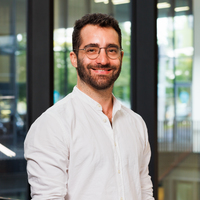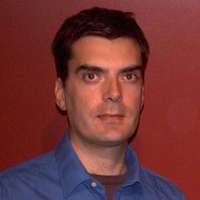
James Kreines
Address: Jim Kreines
Professor of Philosophy
Claremont McKenna College
850 Columbia Avenue
Claremont, CA 91711
Professor of Philosophy
Claremont McKenna College
850 Columbia Avenue
Claremont, CA 91711
less
Related Authors
andrea gambarotto
Université du Luxembourg
Karen Ng
Vanderbilt University
Ansgar Lyssy
Universität Leipzig
Edgar Maraguat
Universitat de València
David Ciavatta
Toronto Metropolitan University
Christian Spahn
Keimyung University
Katerina Deligiorgi
University of Sussex
Thomas Pfau
Duke University
Matteo Mossio
Centre National de la Recherche Scientifique / French National Centre for Scientific Research
InterestsView All (25)








Uploads
Books by James Kreines
Papers by James Kreines
engagement today with Hegel and German Idealism. His approach is unmatched when
it comes to refusing to skip over or look away from the need to recover philosophical
arguments, while actually finding arguments that could support the kind of unified
philosophical system for which Hegel and the German Idealists aim. But the very
success of Pippin’s work has also opened new possibilities for a competing kind of
approach, emphasizing a metaphilosophical priority of metaphysics, to attempt a
similar combination of virtues, creating in turn new challenges for Pippin’s approach
In Reason in the World: Hegel’s Metaphysics and its Philosophical Appeal legt Kreines eine Interpretation vor, die Hegels Wissenschaft der Logik als eine systematisch um metaphysischeProbleme herum organisierte Theorie ausweist. Im Ausgang von Kants Nachweis in der Kritik der reinen Vernunft, die Metaphysik verstricke sich in unvermeidliche Widersprüche, zeigt Kreines die Gründe auf, die Hegel dazu bewegen, den metaphysischen Fundamentalismus in jedweder Form zurückzuweisen – einschließlich eines oft mit Hegel in Verbindung gebrachten metaphysischen Monismus. Bowman, Pinkard und Tolley diskutieren in diesem Kontext zentrale Argumente, werfen Fragen auf und artikulieren Sorgen u. a. in Bezug auf Themen wie Kants Argumentation in der ersten Kritik, das Wesen von Hegels Dialektik, das Verhältnis von Kant und Hegel im Hinblick auf die Frage der Teleologie sowie Hegels Konzeption der absoluten Idee. Kreines antwortet auf seine Gesprächspartner und verteidigt seine Interpretation.
engagement today with Hegel and German Idealism. His approach is unmatched when
it comes to refusing to skip over or look away from the need to recover philosophical
arguments, while actually finding arguments that could support the kind of unified
philosophical system for which Hegel and the German Idealists aim. But the very
success of Pippin’s work has also opened new possibilities for a competing kind of
approach, emphasizing a metaphilosophical priority of metaphysics, to attempt a
similar combination of virtues, creating in turn new challenges for Pippin’s approach
In Reason in the World: Hegel’s Metaphysics and its Philosophical Appeal legt Kreines eine Interpretation vor, die Hegels Wissenschaft der Logik als eine systematisch um metaphysischeProbleme herum organisierte Theorie ausweist. Im Ausgang von Kants Nachweis in der Kritik der reinen Vernunft, die Metaphysik verstricke sich in unvermeidliche Widersprüche, zeigt Kreines die Gründe auf, die Hegel dazu bewegen, den metaphysischen Fundamentalismus in jedweder Form zurückzuweisen – einschließlich eines oft mit Hegel in Verbindung gebrachten metaphysischen Monismus. Bowman, Pinkard und Tolley diskutieren in diesem Kontext zentrale Argumente, werfen Fragen auf und artikulieren Sorgen u. a. in Bezug auf Themen wie Kants Argumentation in der ersten Kritik, das Wesen von Hegels Dialektik, das Verhältnis von Kant und Hegel im Hinblick auf die Frage der Teleologie sowie Hegels Konzeption der absoluten Idee. Kreines antwortet auf seine Gesprächspartner und verteidigt seine Interpretation.
we should not seek to paper over the conflict, but rather to learn from it. The conflict fixes a privileged notion of metaphysics over which they do disagree; this is what I will call “the metaphysics of reason.” I argue that the philosophical
terrain underlying this conflict is surprising: If we look at Kant from Hegel’s point of view, this does not prejudice matters against him; it brings out some otherwise hidden strengths in Kant’s critique of metaphysics in the “Transcendental
Dialectic” of the first Critique. And, similarly, if we then look back at Hegel from the point of view of Kant’s Dialectic—if we look at Hegel as seeking to construct a dialectical form of metaphysics—we can see that Hegel is in a position that is
stronger than has been recognized. Both have arguments that can reach across a conflict extending all the way to the metaphilosophical topic of what philosophy itself should be about. And even today both fans and foes of metaphysics can still learn from engagement with this dialectic of Kant and Hegel.
project in theoretical philosophy: He claims to
argue by an internal engagement with Kant’s critical
philosophy. And yet Hegel also claims to reach by
this means ambitious conclusions about some form
of “absolute idea”, which is supposed to require
transcending the epistemic limits imposed by Kant’s
critical philosophy. I argue that we can better
understand this philosophical project by comparing
the now-familiar idea that metaphysics concerns at
base questions about grounding. Both Kant and
Hegel approach topics in this neighborhood in a
way that is now unfamiliar—and a way that I think
worth considering as a revision to how we think of
metaphysical grounding. Clarifying their approach
then helps, first, to bring into focus how Kant’s
“Transcendental Dialectic” engages metaphysical
questions specifically in order to demonstrate our
epistemic limits. And it helps, second, in clearing
out of the way many of the reasons why Hegel’s
ambitions have often seemed hopeless; we can
understand in these terms why there is real reason
to hope that Kant’s “dialectic” could be of use in
constructing and defending Hegel’s new and
unusual theory of the metaphysics of grounding.
The “Actuality” section of Hegel’s Science of Logic defends his original conception of modality, and provides the final argument for the transition to his own idealist metaphysics in the final book of the Logic. Hegel takes all this to require what he calls “the one and only true refutation of Spinozism” (SL 512/GW 12.15), in the central chapter of “Actuality” (SL 477–88), which is flanked on either side by critical expositions of the concept of the absolute (ch. 1, SL 466–76) and of the categories of substance, causation, and reciprocal action (ch. 3, SL 489–505).
This compact, 40-page section of the Science of Logic is important in at least three respects. Historically, the “refutation of Spinozism” had been a guiding aim of German philosophers since Leibniz and Wolff, and the German Idealist movement pursued it with renewed vigor, placing it at the very heart of their project. This section of the Logic may thus be said to be the measure of Hegel’s contribution to achieving that core ambition. In the context of Hegel’s own system, these three chapters furthermore serve to elucidate key concepts: the absolute; actuality and absolute necessity; substance and substantiality. Finally, with a view to systematic problems from modern and contemporary philosophy, the section represents Hegel’s only detailed and sustained exposition of conception of modality.
The seminar-style workshop invites participants to share in collaborative interpretation and discussion of this important Hegelian text. We will kick off the meeting by considering the relevant passages from Spinoza’s Ethics, and then turn to Hegel’s Science of Logic.
Program
13:00-14:00: Spinoza and some background texts
14:15-15:15: Erstes Kapitel: Das Absolute
Coffee break
15:45-16:45: Zweites Kapitel: Die Wirklichkeit
17:00-18:00: Drittes Kapitel: Das absolute Verhältnis